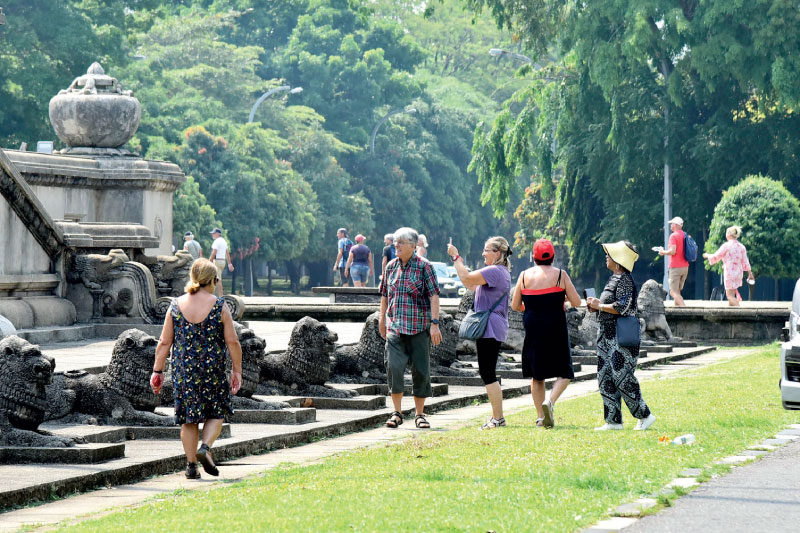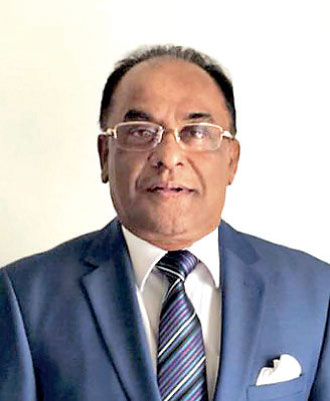Tuesday Feb 24, 2026
Tuesday Feb 24, 2026
Monday, 26 June 2023 04:32 - - {{hitsCtrl.values.hits}}

Tourists enjoy a visit to the Independence Square at Colombo 7 – Pic by Pradeep Pathirana
 |
| The Hotels Association of Sri Lanka President M. Shanthikumar |
 |
| Colombo City Tourist Hotels Association President Rohan Karr
|
The Government has decided to re-introduce the Minimum Room Rate (MRR) in the city of Colombo effective 1 August 2023, a move which hoteliers revealed will further boost foreign exchange earnings from tourism and their financial viability.
Daily FT learns the Government and officials tasked to promote tourism have been concerned for months over the extremely low prices charged by 5-star hotels even after stability returned to the country. The prices as low as $ 60 per night for two persons with inclusives such as breakfast, 30% tax etc. are being extended. As per plans, the new MRR for 5-stars will be $ 130++, $ 100++ for 4-stars and $ 80++ for three stars.
A MRR regime was prevalent between 2010 and 2019 before being disbanded following the Easter Sunday attacks.
Tourist arrivals peaked to 2.3 million in 2018, the industry’s best year whilst last year it fell to 700,000, the same level as way back in 2010.
With rampant price undercutting amidst rise in costs, city hoteliers’ financial viability was at stake jeopardising the revival of tourism. In that context, MRR will help stabilise prices and help restore financial viability for hotels and more importantly, boost earnings from tourism. MRR will also help re-position Colombo from being known as a cheap destination.
With the need to draw higher end tourists the city hotels require to improve product quality and service stands as well. Colombo has an inventory of over 7,000 rooms and over the next 24 months, an additional 2000 new rooms at the luxury end will open.
When contacted by the Daily FT on the impending MRR, The Hotels Association of Sri Lanka (THASL) President M. Shanthikumar and Colombo City Tourist Hotels Association (CCTHA) President Rohan Karr hailed the move and thanked the Government for the timely intervention.
“Whilst we understand that this decision might not please everyone, the need of the hour is to generate more revenue to sustain operations and to attract more foreign exchange to the country and this plan is expected to help achieve this,” said the two experienced hoteliers.
Shanthikumar went on to explain that hotel members were unable to increase prices due to pressure from other stakeholders in the industry even though there is a crying need to stabilise pricing. In the recent past, we have repeatedly requested even through the media for the implementation of a minimum rate for Colombo hotels, as we cannot go to the Government with a begging bowl anymore, he said.
Objections were raised by certain parties when a pricing policy was rolled out many years ago but the results at the time were phenomenal with Colombo hotels doubling/tripling their revenues and employee service charge doubling in addition to their monthly salaries.
Shanthikumar said these statistics are an endorsement of the benefit of such policies. He reiterated the need to be positive and move forward keeping the interest of hoteliers and the country at large in mind. There might be a slight impact on business in the initial months due to pull out of some of the local suppliers but this is expected to stabilise over the months, he added.
Shanthikumar fully appreciated and supported the move and thanked the Government leadership, Tourism Minister Harin Fernando and his officials and Sri Lanka Tourism Development Authority Chairman Priantha Fernando for understanding the plight of the hoteliers.
Shanthikumar was also emphatic on following the country’s leadership to drive tourism business and to be innovative and bring in new strategies to get more dollars to the country.
CCTHA President Rohan Karr said that Colombo received the direct brunt of the 2019 Easter Sunday attack, the pandemic, the 2022 political unrest and the economic crisis.
He revealed that the city is seeing an improvement in the occupancy with the city averaging 50% to 55% occupancy vs. 30% two months ago.
“Unfortunately, the pricing still is at an all-time low. The hotels and the country are being deprived of foreign exchange,” added Karr.
Whilst expressing confidence that business will stabilise by the end of the year to normal levels, Karr however was concerned that the rates will still remain very low.
He too was appreciative of the minimum rate and thanked all officials for working hard to get this into place.
“At every meeting, members were requesting for such a pricing policy to be in place as they could not make ends meet and pay back the debt burden,” revealed Karr who currently serves as an Executive Director of the Board of Hayleys PLC and the Hayleys Leisure Sector Managing Director. With a proven track record of revitalising hotel businesses, Karr brings over four decades of experience in the hospitality industry in Sri Lanka and in the United Kingdom.
He went on to state that Colombo has quality star class hotels that offer the finest services but low pricing at the top end was causing a great concern to the smaller hoteliers as they could not even sell their products at $ 30. The MRR will stabilise this situation and overall, it will be of great benefit to the country, hoteliers and its employees, he emphasised.
Some stakeholders are stating that MRR will see a decline in the Indian market, which has been the main market for Colombo. Both Shanthikumar and Karr, who are city hotel veterans, dismissed it.
India is a huge market out there and their economic growth which is seen as one of the best in the world means their propensity to spend is much higher. They pointed out that with a population of 1.5 billion people, there is business at every level and across segments such as FIT’s, groups, MICE, weddings, special interest groups, honeymoon travel, family travellers etc. etc. Further, with 1 INR = Rs. 3.5, Sri Lanka still becomes an attractive destination for the Indian market.
The duo are confident that the potential of the Indian market for the city will not decline. They called upon the hoteliers and the suppliers to think out of the box and target higher paying clients. “Now is the time to make a change and showcase the best of Sri Lanka. The need to move forward forcefully was key to success,” stressed Shanthikumar and Karr.
Hotels employ over 70% of the tourism industry workforce and is the largest investor with an estimated investment of $ 15 billion. The highest contribution to the Government coffers comes from hotels by way of taxes, levies, license fees etc.
